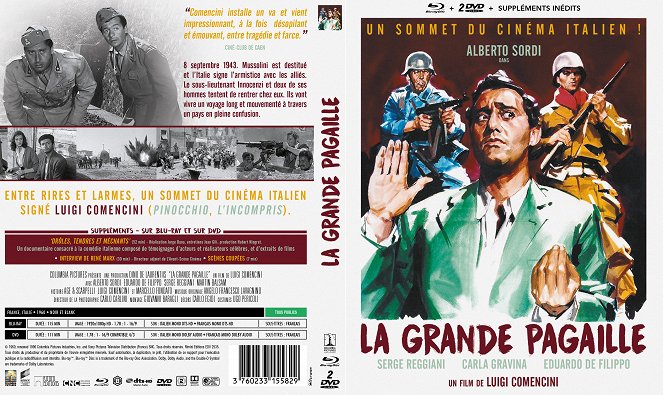Reżyseria:
Luigi ComenciniZdjęcia:
Carlo CarliniObsada:
Alberto Sordi, Eduardo De Filippo, Serge Reggiani, Martin Balsam, Didi Perego, Alex Nicol, Carla Gravina, Vincenzo Musolino, Nino Castelnuovo, Mac Ronay (więcej)Opisy(1)
On September 8 1943, Armistice day, there was a great wave of hope that the war was over, but there was also a great deal of confusion. The army was in disarray and most of the soldiers only wanted to go home. Alberto Innocenzi, a second lieutenant, tries to keep his regiment together and reach headquarters to find out what to do. He is in the company of just a few soldiers: sergeant Fornaciari, sapper Ceccarelli, and the artilleryman Codegato, and he decides to go with them towards their respective hometowns. The journey, though, is beset with difficulties which show just how far off the end of the war is. Artilleryman Codegato, having helped a Jewish woman captured by the Germans, is the first to succumb. Then it's the turn of Farnaciari, arrested together with his wife for having sheltered an American soldier. Now by themselves, Innocenzi and Ceccarelli arrive at the home of the lieutenant's father who wants his son to enlist with the Salo' Republic's army. Disgusted, Innocenzi has no other choice than to follow Ceccarelli to Naples where they find the Germans and a mass uprising waiting for them. (Venice International Film Festival)
(więcej)Recenzje (1)
An unknown and exceptional war film, which is interesting primarily because of its perspective and depiction of the environment of defeated fascist Italy. The war is captured from the viewpoint of an Italian officer, who experiences disillusionment and the loss of his values upon his return home after the Italian surrender and the dissolution of the regular Italian army. The soldiers of his unit disperse, leaving only a few men heading in the same direction. The screenwriter embodies certain experiences typical of that time in their characters. Despite the chosen lighter tone of storytelling, it is essentially a tragic anti-war film, where practically all the main characters gradually perish, with the exception of the main protagonist, who is, however, very close to it during the final clash in the chaos of war when we leave him. The film is shot with an ethos typical of post-war Italy and France, explaining the political situation of the time from the perspective of the victorious anti-fascist coalition, and glossing over certain unpleasant aspects of the reality of the time. The screenplay therefore employs some simplifying techniques, such as the scene of the Jewish woman being discovered by German soldiers, which is not credible. If the screenwriter were honest, he would have let the passengers on the bus expose her for her share of the loot hidden in the trunk. The revelation of an American prisoner hidden with an anti-fascist family would naturally not just lead to the execution of the man as the head of the family but to the annihilation of the whole family, and especially the brutal rape of the wife, which incidentally was commonly committed by both fighting sides. It is highly probable that a high-ranking Italian officer would not immediately join the partisan resistance organization controlled by the Communists after the Italian surrender... I could go on. Despite the mentioned minor screenwriting flaws, it is an excellent war film that has a great cast and performances. Overall impression: 80%.
()
Galeria (13)
Photo © Rimini Editions

